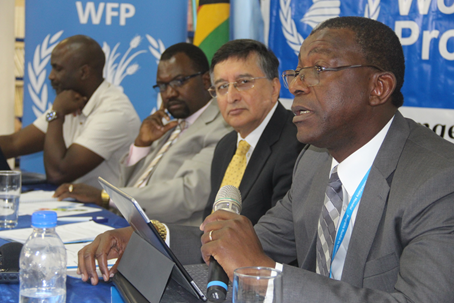By Joyce Mukucha
The World Food Programme (WFP) is maintaining strong humanitarian assistance capacity through its Country Strategic Plan (CSP) which focuses on supporting long-term national social protection and resilience building efforts to achieve Zero-hunger in Zimbabwe.
It is estimated that by 2050, both the risk of hunger and child malnutrition could increase by 20 percent each. This will be due to climate change that would affect the most food-insecure people around the world, most of whom live in countries that are prone to natural disasters and face high levels of environmental degradation.
Thus, WFP, has the objective to assess the prevailing of food and nutrition security as well as the impact of the food assistance and input support programmes on rural livelihoods.
Mr Eddie Rowe, WFP Representative and Country Director who was the guest speaker at the WFP’s Country Strategic Plan discussion on the 30th of April 2018 in Harare said as his organisation moves into the second year of its CSP activities, it would strengthen activities of resilience -building to ensure that hunger was eradicated in the country.
“WFP is structuring on its inventive effort in knowledge and evidence generation, whilst increasingly focusing on strengthening the systems and institutions that are ultimately responsible for sustainably reaching Zero Hunger in Zimbabwe.
“As we remain with our efforts to help different communities of Zimbabwe in as much as food security and provision of resilience-building before and after climatic shocks, we will continue to walk with the vision of eradicating hunger in communities.
“WFP will expand our food programme to promote resilience to livelihoods but it will not end at only providing food but make sure that support is extended to communities and ensure that households of the most vulnerable have assets which help them to fight natural disasters. As the Agenda 2030 attests, we are committed to strengthen the capacities of Government entities that strive to fight hunger in the nation. It is our aim to ensure that food security prevails to all under five years children of selected districts,” he said.
Mr Rowe indicated that as WFP heads into the second year of its CSP, it was committed to promoting gender equality by ensuring that women assumed leadership and decision making roles. He said they were taking practical measures to support Sustainable Development Goals (SDGS) in different sectors which include education, infrastructure, and health among others.
Explaining more about WFP, Mr George Kembo from the Office of the President and Director of Food and Nutrition Council said it was a great pleasure to celebrate one year of CSP achievement and success.
“Asset creation was received from WFP and I can witness that through coordination, we are working to reduce stunting growth in Mutasa where we are working in multi-sectorial to address different issues such as HIV/AIDS, community enhancement and ways of solving disasters.
He said they were working to reduce stunting in, Mutasa, Manicaland province.
Mr Albert Muraisa, a representative from World Vision Zimbabwe weighed in: “It has been a fruitful journey with WFP which provided an opportunity to deepen our commitment to eradicate hunger and ensure improved nutrition. CSP provided an opportunity for partners to find holistic approaches aimed at ending hunger in Zimbabwe.”
Muraisa said World Vision looked forward to continue partnering with WFP as well as different organisations in order to save lives.
In the last decade, 47 percent of WFP’s interventions included response to climate disasters with a budget of US$23 billion and in March, WFP assisted 11,272 refugees at Tongogara Refugee Camp.
